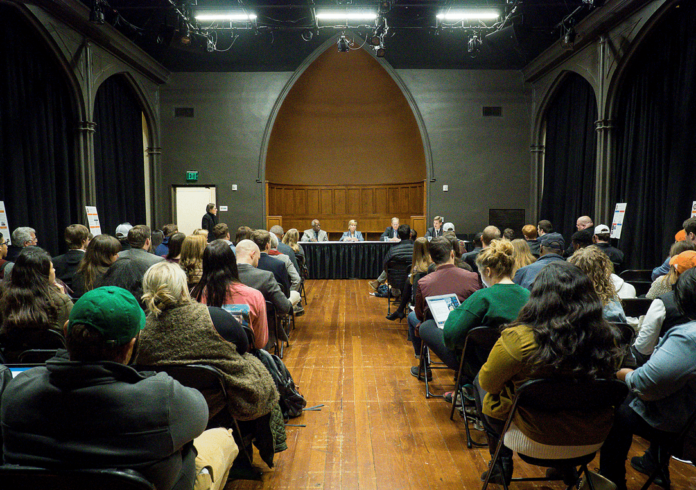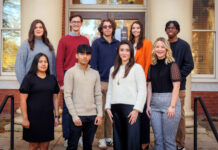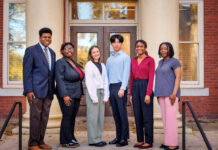
Twenty-nine Mercer students got up close and personal with the midterm election this fall. They learned what it means to get out the vote and why young voters matter during Dr. Chris Grant’s Campaigns and Elections course.
Dr. Grant, professor and chair of the Political Science Department in the College of Liberal Arts, has been teaching the class for about 20 years, but this was the first time the class culminated with a public event where experts participated in panel discussions about the election cycle and students shared their research findings. The Nov. 27 event was supported by a Research That Reaches Out grant.
“I have always done an applied campaign experience with students. This is the first time we’ve taken the research out of the class and are using it to inform the professional community,” Dr. Grant said.
Each student was required to work for a state or local campaign and follow a U.S. Senate race. Stephen Galloway, a senior law and public policy major, followed the Arizona Senate race between Democrat Kyrsten Sinema and Republican Martha McSally. As a volunteer with Stacey Abrams’ campaign for governor, he knocked on doors, made phone calls, helped manage the local campaign office and trained workers.
Tamara Andrews, a senior political science major, studied the Montana Senate race between Democrat Jon Tester and Republican Matt Rosendale. She also volunteered with Southern Majority political strategist group and used a peer-to-peer messaging app to contact voters on behalf of Aisha Yaqoob for Georgia House District 97 and Richard Keatley for Georgia Labor Commissioner. Andrews said she sent 28,000 text messages over the course of just two days.

“I definitely learned a lot in the class, but I guess what I found the most surprising was young voters’ involvement here in Georgia,” Galloway said. “I saw a lot of youth involvement and engagement on the ground talking to folks, seeing that young voters are actually engaged in politics.”
Divided into seven groups, students analyzed how voters younger than 30 were approached in campaigns and prepared posters on topics such as partisan leanings, get-out-the-vote efforts, issue resonance, diversity, social media campaigns and social activism.
The groups presented their projects during the Nov. 27 event at Tattnall Square Center for the Arts, following a panel discussion with Bethany Ballard of the Houston County Republican Party, Amy Morton of Southern Majority and Joey Wozniak of Mile 22 Associates.
A second panel discussion later that evening featured Mercer School of Law Dean Cathy Cox, who was Secretary of State from 1999-2007 and a governor’s candidate in 2006; Jack Kingston with law firm Squire Patton Boggs, a U.S. representative from 1993-2015 and 2014 Senate candidate; Charles Richardson, retired opinion page editor for The Telegraph in Macon and artist-in-residence at Middle Georgia State University; and Greg Bluestein, political reporter for the Atlanta Journal-Constitution. The discussion was moderated by Dr. Audrey Haynes, associate professor and director of the Applied Politics Program at the University of Georgia.
“We are an incredibly large part of the population,” said Galloway, whose group looked at how diversity affects the turnout of under-30 voters at the polls.
“As Baby Boomers continue to get older and Millennials get into the work force, our voice is going to matter more and more. Political organizations need to figure out how to target us and how to cater to our wants and needs.”
The world of political campaigning is changing as methods never seen before are implemented, Dr. Grant said. For instance, this is the first election cycle where he received text messages asking if he had voted, and the Stacey Abrams campaign looked at absentee ballots in a new light.

“There was such intensity focused on first-time voters and young voters for a midterm election. That’s totally different from what we’ve seen in past elections,” Dr. Grant said. “There are new ways of gathering information that are changing their age group, and it changes the way that campaigns are trying to capture them.”
The course taught students valuable research skills and gave them more insight into the political world, Dr. Grant said. Andrews said the class helped her become a more informed voter with a better understanding of the election process, especially in cases where there were close races. She saw processes play out that she didn’t know existed. The class showed her why young people should be invested in political issues and start taking action.
“It’s really made me become more aware of my peers and the people around me and the work that needs to be done,” she said. “We’re all young adults. It’s going to take us paving the way and taking interest in those issues. We will be the majority of the population in our country, and that’s not too far away.”









